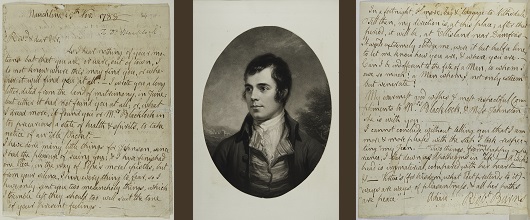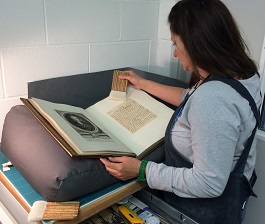Lost letters from historical greats rediscovered

Letters from Elizabeth I, Robert Burns, Voltaire, James VI, Benjamin Franklin and prison reformer Elizabeth Fry – these are just some of the examples in a new collection of once lost letters donated to the University of St Andrews Library.
The Marseille Middleton Holloway Collection is a fascinating collection of historical documents associated with some key figures in British and French political and literary history. Comprising of two bound albums, the collection contains a wide range of material from the 16th to the 20th centuries and offers an important new resource for scholars of politics and literature.
The letters were collected in the 19th century by Marseille Middleton Holloway, one of the leading bookdealers in London, from 1854 until his death in 1897. The collection was passed from Holloway to the Williams family, who have connections with the University of St Andrews, making this acquisition doubly special. The collection remained in private hands until its acquisition by the University.
Among the letters of special interest in the collection include previously lost correspondence from Robert Burns to Rev Dr Thomas Blacklock, the Blind Poet which includes two original poems, A Mother’s Lament for the Loss of her Son and The Lazy Mist to a tune from James Oswald’s Caledonian Pocket Companion, dated 5 November 1788.
 Leading Burns biographer Robert Crawford, Professor of Modern Scottish Literature at the University of St Andrews, said: “This rediscovery brings back into the public domain manuscripts which are listed as location unknown in the standard modern edition of Burns’ Letters. Written from Mauchline in November 1788 to the remarkable blind poet, musician and Scots song enthusiast, the Reverend Dr Thomas Blacklock, the letter pays warm tribute to Blacklock as one of Burns’ most important Edinburgh supporters.
Leading Burns biographer Robert Crawford, Professor of Modern Scottish Literature at the University of St Andrews, said: “This rediscovery brings back into the public domain manuscripts which are listed as location unknown in the standard modern edition of Burns’ Letters. Written from Mauchline in November 1788 to the remarkable blind poet, musician and Scots song enthusiast, the Reverend Dr Thomas Blacklock, the letter pays warm tribute to Blacklock as one of Burns’ most important Edinburgh supporters.
“The Lazy Mist protests that ‘Life is not worth having with all it can give’. These were written just a few weeks before the earliest dated manuscript of Burns’ Auld Lang Syne. Burns makes it clear in his letter to the blind poet that he admires not just Scots songs but also the great English satirist Alexander Pope.”
Other letters in the collection include one from Lord Byron to his old friend Canon Hodgson, his former tutor at Eton, with a previously redacted line, unknown for 187 years: ‘Drury I hope you left well, he is sadly spoiled by marriage, but what will it not spoil?’
The letter was first published by Thomas Moore in his 1830 Life of Lord Byron, with two lines redacted. Moore’s is the only text of the letter that has been available since then. These sorts of silent omissions were very common in 19th century editions when it was customary to shield persons still living from the personal remarks of those whose writing was being published for the first time.
The bound albums, one with 37 letters written by historical figures and one with 37 letters written by literary names, are accompanied, in some cases, by plates showing portraits of the letter writers. The letters went on display at a special event on Tuesday 24 October 2017 at the University of St Andrews Martyrs Kirk Research Library.
The University’s Special Collections team will preserve the collection for future generations. Once conserved and digitised, the material will be freely available online. In the meantime, the letters will be available for consultation by appointment.
NOTES TO NEWS EDITORS
Gabriel Sewell, Assistant Director (Special Collections), is available for interview via the Communications Office – contacts below.
A detailed list of all letters in the collection with brief outline of content for each is available online.
Williams Family
Professor John Williams was a Professor of History at St Andrews from 1929 to 1955. Professor Williams’ sister Mabel was the wife of Sir James Irvine, Principal and Vice-Chancellor of the University of St Andrews from 1920 to 1952. Special Collections also holds a small collection of 17th century books presented to the Library after Professor Williams’ death.
Professor Robert Crawford
Robert Crawford is Professor of Modern Scottish Literature and Bishop Wardlaw Professor of Poetry at the University of St Andrews. Professor Crawford is a poet, biographer, critic and literary historian who has published seven full collections of poetry and many prose books. At present he is working on the second volume of a biography of T. S. Eliot.
Professor Crawford has held posts at the universities of Oxford, Glasgow and St Andrews. A Fellow of the British Academy and of the Royal Society of Edinburgh, he was President of the Classical Association in 2015 to 2016 and is Honorary President of the Classical Association of Scotland.
NOTES TO PICTURE/ONLINE EDITORS
Photographs are available online.
Media and photographers are welcome to attend the event Tuesday 24 October 2017 at the University of St Andrews Martyrs Kirk Research Library. Contact the Communications Office below to arrange.
Issued by the University of St Andrews Communications Office, contactable on 01334 467310 or [email protected].
Category Research